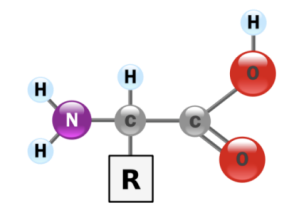We all know protein helps build strong muscles. Protein like other macronutrients- fats and carbohydrates- is composed of carbon, hydrogen, and oxygen. unlike the others, protein has another ingredient- nitrogen. When nitrogen couples with the other elements, it makes amino acids.

Amino Acids are the building blocks of protein. There are 20 different amino acids. Amino acids can and do arrange themselves in a variety of different ways. When they do, they form different kinds of protein.
There are almost infinite number of proteins that can be made through all the different combinations of Amino Acids.
The body contains 50000 different protein containing compounds, some of which include: hemoglobin, enzymes, antibodies, hormones, growth and maintenance proteins. The functions of the protein depend on how the amino acids are lined up.
Your body will use protein as energy, although rarely, if your body doesnt take in enough energy from other macronutrients. This can be a problem because it robs the body of amino acids which aid in the bodies functions.
Our body does the following with protein:
1. Breaks down the amino acids that compose the protein
2. combines them with the amino acids that your body produces
3. produces these new proteins that it needs for growth, repair, and other bodily functions.
Your body produces 11 non-essentials amino acids, but cannot produce the 9 essential amino acids. That is why it is neccessary to eat foods that contain the 9 essential amino acids. Your body cannot store them like it does carbs and fats, so you have to eat foods that contain the on a regular basis.
- histidine
- isoleucine
- leucine
- lysine
- methionine
- phenylalinine
- threonine
- tryptophan
- valine
Non-Essential Amino Acids:
- glycine
- glutamic acid
- arginine
- aspartic acid
- proline
- alanine
- serine
- tryosine
- cysteine
- asparagine
- glutamine
Each cell in your body contains small protein factories called ribosomes, and each cell also contains DNA. DNA is like an instruction manual for making and maintaining an organism. The ribosome reads the DNA code it contains and assembles the amino acids for that particular cell.
So know you know what Amino Acids are! How do they help you and what do they do?
ESSENTIAL AMINO ACIDS
HIstidine: Histidine creates histamine which helps the system fight allergies. Also you need it to repair your cells and tissues and maintain your myelin sheath that helps safeguard your nerve cells. Also this can help synthesize your red blood corpuscles and white blood corpuscles and your body can be protected from heavy metal toxicity. It also induces the creation of digestive juices and can arouse you sexually. It is the general acid that helps in orgasms and ejaculating. Histidine is also considered to be a good way to help people who suffer from problems like arthritis and deafness of the nerves. This is used to cure rheumatoid arthritis. It also helps regenerate tissues and muscles.
Isoleucine: Isoleucine is an amino acid that is known to help increase endurance, heal and repair muscle tissue, and encourage clotting at the site of an injury. Isoleucine is thus especially important to athletes and bodybuilders as its primary function in the body is to boost energy and help muscles recover from strenuous physical activity. Isoleucine is also needed for the production of hemoglobin and helps to regulate blood sugar levels in the body
Leucine: The body’s protein structures are made up of about eight percent Leucine, which is the fourth most concentrated amino acid in muscle. Leucine is not only essential to your health, but is beneficial for bodybuilders. Leucine helps maintain muscle tissue through sustaining nitrogen balance, supplies energy to the body even when under the stress of training and preserves muscle glycogen used for muscle contraction. Leucine is essential for a muscle building environment and assists mental ability even when exercise becomes more intense. Leucine is the strongest of the BCAA’s and if you do not have enough of it in proportion to other amino acids, your body cannot utilise what you ingest. An Leucine deficiency will mean that you cannot use protein that you consume, regardless of how much you have. So basically, without Leucine, your protein consumption is wasted!
Lysine: Lysine, along with the amino acid methionine, is used by the body to synthesize carnitine, which helps cells to break down fat to produce energy. Carnitine has been proposed as a treatment for heart failure, angina and weight loss in people with fatty acid oxidation defects.
Lysine, with the amino acid arginine, is necessary for collagen synthesis and so plays an important role in building skin, ligaments and tendons.
Phenylalanine: Phenylalanine supplementation may help you feel happier, less hungry and more alert; it has also to treat chronic pain and improve memory and concentration. Phenylalanine is needed for normal functioning of the central nervous system. It has been used successfully to help control symptoms of depression and chronic pain, as well as other diseases linked to a malfunctioning central nervous system.
Threonine: Threonine supports cardiovascular, liver, central nervous, and immune system function. Threonine aids in the synthesis of glycine and serine, two amino acids that help in the production of collagen, elastin, and muscle tissue. Threonine helps build strong bones and tooth enamel. It also speeds up wound healing after injury by boosting immune system. Threonine combines with the amino acids aspartic acid and methionine to help liver digest fats and fatty acids, which reduces accumulation of fat in the liver. An accumulation of fats in the liver can affect negatively its function. Threonine is useful in treating Lou Gherig’s Disease, also known as Amyotropic Lateral Sclerosis (ALS). Research shows that symptoms of Multiple Sclerosis (MS), another disease that affects nerve and muscle, are alleviated with threonine treatment. Threonine is an immunostimulant, which promotes the growth of thymus gland.
Valine: Some of the benefits of L-Valine include improvement in insomnia and nervousness. It is also shown to improve disorders of the muscles, and is effective as an appetite suppressant.
L-Valine also greatly benefits the regulation of the immune system. Perhaps the biggest benefits are experienced by athletes who perform long distance sports and bodybuilding. L-Valine is essential for muscle tissue repair and muscle metabolism, and also increases exercise endurance.
NON-ESSENTIAL AMINO ACIDS
Glycine: Glycine is used in the body to help construct normal DNA and RNA strands—the genetic material needed for proper cellular function and formation. It helps prevent the breakdown of muscle by boosting the body’s levels of creatine, a compound that helps build muscle mass. High concentrations of glycine are found not only in the muscles, but in the skin and other connective tissues as well. Almost 1/3 of collagen, which keeps the skin and connective tissue firm and flexible, is composed of glycine. (High amounts of Glycine are also found in gelatin, which is a form of denatured collagen). Without glycine the body would not be able to repair damaged tissues; the skin would become slack as it succumbed to UV rays, oxidation, and free radical damage, and wounds would never heal.
Glutamic Acid: Glutamic acid, also called glutamate, is an excitatory neurotransmitter that increases the firing of neurons in the central nervous system. It is a major excitatory neurotransmitter in the brain and spinal caord. It is converted into either glutamine or Gamma-Aminobutyric Acid (GABA), two other amino acids that help pass messages to the brain. Glutamic Acid is important in the metabolism of sugars and fats, and aids in the transportation of potassium into the spinal fluid and across blood-brain barrier. Although it does not pass the blood-brain barrier as readily as glutamine does, it is found at high levels in the blood and may infiltrate the brain in small amounts. The brain can use glutamic acid as fuel.
Arginine: Arginine is needed to keep the keep the liver, skin, joints, and muscles healthy. Arginine helps strengthen the body’s immune system, regulates hormones and blood sugar, and promotes male fertility. In addition, research has shown that this amino acid may improve circulation and treat impotence and heart disease.
Aspartic Acid: Aspartic acid, also known as L-aspartate, is thought to help promote a robust metabolism, and is sometimes used to treat fatigue and depression. Aspartic acid plays an important role in the citric acid cycle, or Krebs cycle, during which other amino acids and biochemicals, such as asparagine, arginine, lysine, methonine, threonine, and isoleucine, are synthesized.
Proline: Proline helps the body break down proteins for use in creating healthy cells in the body. It is absolutely essential to the development and maintenance of healthy skin and connective tissues, especially at the site of traumatic tissue injury. Proline and lysine (another one of the amino acids that is important to protein synthesis) are both needed to make hydroxyproline and hydroxylysine, two amino acids that form collagen. Collagen helps to heal cartilage and to cushion the joints and vertebrae. For this reason, proline supplementation may prove beneficial for treatment of conditions such as osteoarthritis, persistent soft tissue strains, and chronic back pain.
Alanine: Alanine, or L-alanine, is an amino acid that helps the body convert the simple sugar glucose into energy and eliminate excess toxins from the liver. Alanine has been shown to help protect cells from being damaged during intense aerobic activity, when the body cannibalizes muscle protein to help produce energy.
Serine: Serine is a non-essential amino acid derived from the amino acid glycine. It is important to overall good health, both physical and mental. Serine is especially important to proper functioning of the brain and central nervous system.
Tyrosine: The body needs adequate supplies of tyrosine to make many important brain chemicals that help regulate appetite, pain sensitivity, and the body’s response to stress. It is also needed for normal functioning of the thyroid, pituitary, and adrenal glands—low levels of tyrosine may lead to hypothyroidism, low blood pressure, chronic fatigue, and sluggish metabolism.
Cysteine: Cystine is a sulfur-containing amino acid that helps form healthy skin, hair, bones, and connective tissue. It is also required to make glutathione, one of the natural antioxidants that fight free-radical damage (glutathione detoxifies the liver). Each molecule of cystine is made from two molecules of cysteine, another sulfur-containing amino acid that, as its name suggests, is very similar to cystine; in fact, cystine is generally regarded as the more stable form of cysteine, although both amino acids can be converted into the other as needed.
Asparagine: Asparagine, created from another amino acid, aspartic acid, is needed to maintain balance in the central nervous system; it prevents you from being either overly nervous or overly calm. As it is converted back into aspartic acid, asparagine releases energy that brain and nervous system rells use for metabolism. It promotes the process by which one amino acid is transformed into another in the liver.
Glutamine: Glutamine helps prevent catabolizing (muscle breakdown) and helps produce new muscle tissue through protein synthesis. Glutamine is also beneficial in boosting the body’s production of growth hormones, and it improves mental sharpness. Athletes and bodybuilders should consider taking Glutamine supplements because intense workouts quickly deplete the body’s supply. Another benefit of Glutamine is its effect on the immune system. It is one of the building blocks of the immune system. Athletes put added stress on their bodies with intense workouts, and are more susceptible to illness. Taking supplements helps to lower your risk of illness, so that you don’t miss your workouts and your body stays healthy and strong.
Amino Acids play one of the most crucial roles in our bodies. they are the building blocks for all our bodily needs. Athlete or not we all need amino acids. Some of us need more of one, and others more of another. Our diets do not give us the proper amounts required so supplementing amino acids before and after workouts, physical activity or for just everyday health is needed.
Yours in Health,
360 Supplemental Nutrition
Supplement Health. Supplement Life.

